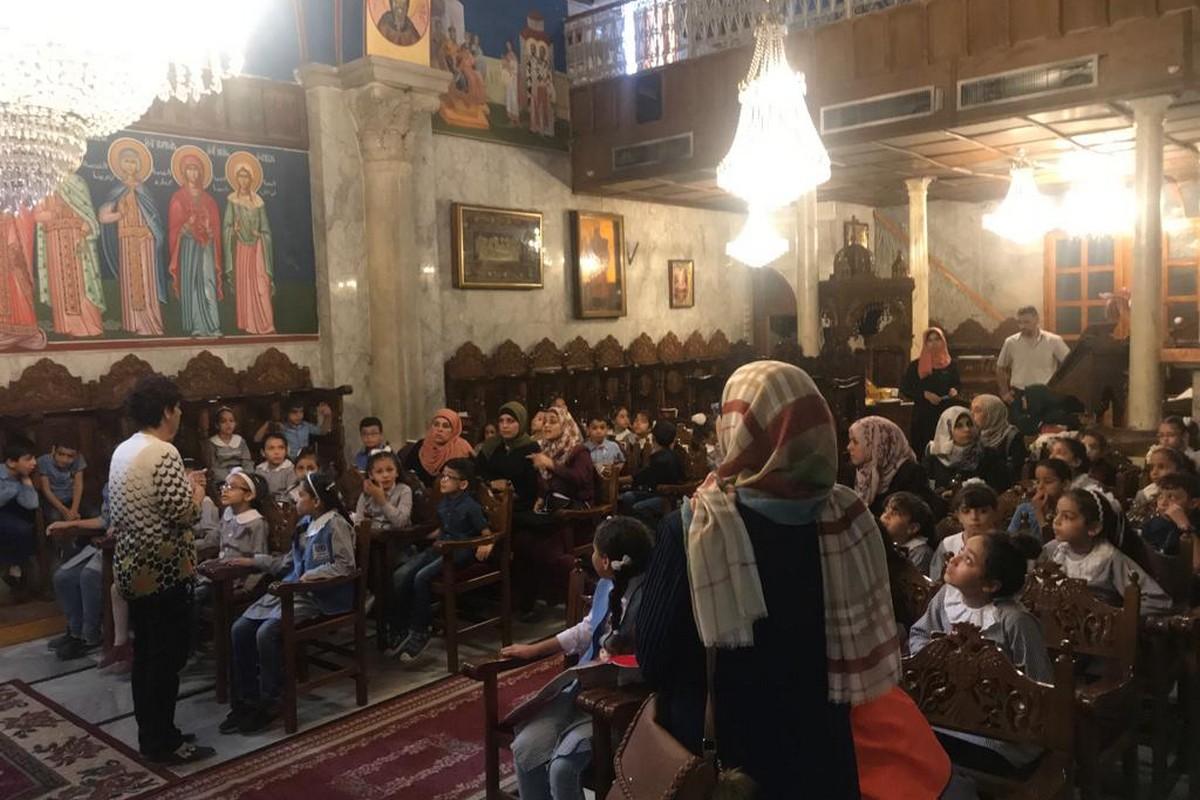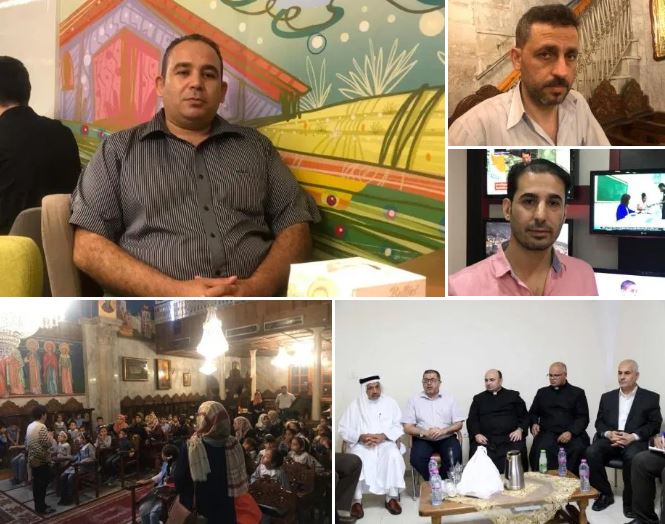Gaza Christians are not a minority, but an intrinsic part of Palestinian society

Samer Tarazi, 39, was at his desk giving instructions to a news producer and a cameraman at Al-Watania Media Agency on the ninth floor of Al-Jawhara Building in the centre of Gaza City when I met him. “Please,” he told his colleagues, “go to Al-Attareen Market and take shots of people shopping and get vox-pops for them commenting on the deteriorating economic situation here.”
The two young men went to work and Tarazi’s secretary told him that his mother was on the phone from Australia. He apologised to me and spoke with her for about five minutes. “I have not seen her for ten years,” he explained; his parents and all of his family members migrated to Australia 10 years ago.
“If the international community does not stop Israel’s aggression against the Palestinians,” the technical director of Al-Watania told me, “you will not see any Christians in Gaza within a decade.”
Tarazi lived happily with his family until 2007, when the Israeli occupation authorities imposed a strict siege on the Gaza Strip which has virtually paralysed social and economic life. Tens of thousands of Palestinians have fled the siege, including Tarazi’s family, but the situation for Christians is very different to that of the Palestinian Muslim citizens.
There are two Christian communities in Gaza – Catholic and Orthodox — but there are no precise statistics for them. Neither of the two Churches in Gaza keeps such records, but according to Tarazi there were more than 30,000 Christians in Gaza in 1948. By 1987, though, when the First Intifada started, the number was only 18,000 and it has continued to decline because of Israeli aggression against the Palestinians. By 2006 there were just 2,500 Palestinian Christians in the enclave. “Today,” said Tarazi, “there are only 800.”
According to the director of public relations at Saint Porphyrius Church in Gaza’s Old City, it is indeed the Israeli aggression which is the main reason for the declining Christian population in the besieged territory. “We are part of the Palestinian people and we are affected by everything that affects everyone else,” Kamel Ayyad pointed out. “We experience all forms suffering under the Israeli occupation like our fellow citizens. Christians who left Gaza and those who are thinking of leaving are escaping from the occupation, siege and military offensives. They are looking for stability and freedom of movement.”
Both Tarazi and Ayyad stressed that restricted movement is an issue for them because it affects an essential part of their life; celebrating religious holidays with relatives and friends and people of their faith is important for them. Like all of Gaza’s residents, most of the Christians have relatives in the occupied West Bank and Israel, but because of the lack of travel permits, they cannot celebrate their holidays together.
Since 2007, few Christians from Gaza have obtained travel permits to go to the West Bank and Jerusalem during the holiday season. “Israel says it issues 500 travel permits every year,” noted Tarazi, “but actually the figure is more like 200 at most.”
Tarazi has three children, all of them under ten years old. “They had travel permits this year, but neither their mother nor I had one,” he told me. “How can they travel without their parents? This is what happens with many families who get permits.”
“We cannot visit the Church of the Nativity or the Church of the Holy Sepulchre,” said Ayyad, “even though they are a stone’s throw from our homes. Christians from around the world can visit them and pray there, but we can’t.” He also blamed the Israeli occupation for the emigration of Christians from Gaza because of the strict siege. “Like other Palestinians, Christians leave the Strip to look for work and a better life.”
Throughout history, Christians have been part of Palestinian society. They are an intrinsic element of Palestinian history, tradition and culture.
One Christian resident of Gaza pointed out that they are not a minority. “We are part of Palestinian society,” insisted George Antwan. “We have the same history and we share the same traditions and culture. During the Holy Month of Ramadan, like Muslims, we eat Qatayef and buy the Ramadan lights for our kids. We also celebrate Eidul-Fitr and Eidul-Adha like the Muslims, who also celebrate Christmas.”

Christian and Muslim Palestinians exchange visits during social and religious occasions. Muslims visit the Churches and congratulate Christians on their holidays and attend their social and religious events. Christians do the same on the Muslims’ special days.
“Our forefathers fought alongside Salahuddin Al-Ayoubi against the Crusaders who invaded Palestine,” added Antwan. This shared struggle was also mentioned by Ayyad, who has been banned from travelling by Israel for three years: “We are fighting the Israeli occupation side-by-side with the Muslims. We are part of the Palestine resistance.”
All Christians that I met, including the Greek Orthodox Archbishop Alexios at Saint Porphyrius Church, told me that they maintain good relations with the ordinary people in Gaza, as well as with the Islamist rulers of the coastal territory. When asked about allegations of religious persecution by Hamas, the Islamic Resistance Movement which governs Gaza, Tarazi stressed that, “We have never had any form of discrimination in in Gaza.”
“Hamas leaders visit the Church and we maintain good relations with them,” said Ayyad. “However, we all hope that the political division is ended soon and the Islamic Movement is united with the other Palestinian factions.”
Antwan admitted that there are sometimes problems. “But this is not the norm. When it does happen, though, we do not feel that Muslims take the side of their fellow Muslim, they deal with the situation without any consideration for the religious background of the protagonists.”
At the start of this month, a delegation from Hamas visited the Church of Saint Porphyrius and met with Archbishop Alexios. The delegation discussed social relations, tolerance and fraternal relations between Muslim and Christian Palestinians. Such values are core principles for the Palestinian people, Hamas insisted.
During the meeting, delegation member Basem Na’im pointed out that the Israelis do not distinguish between the two faith groups when they attack Palestinians. “Christians live securely in Palestine,” added Maher Al-Houli. “They are equal to Muslim residents, and this visit confirms our shared values of coexistence and peace.”
Archbishop Alexios expressed his thanks and appreciation for the visit to the Church. He noted that this is an example of the tolerance and coexistence between Muslims and Christians in Palestine.
“We, as Christians, do not feel that we are isolated in Gaza, and Hamas reciprocates love, respect and appreciation with us,” the Archbishop concluded. “The Christian community in the territory is an integral part of the Palestinian people, and shares the same suffering and same hopes.”
Source: Motasem A Dalloul, Middle East Monitor

WRITE YOUR COMMENT